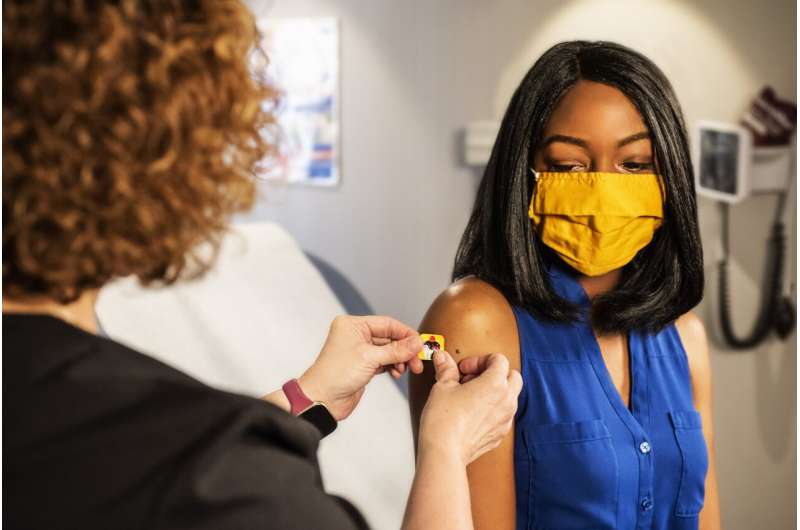This article has been reviewed according to Science X's editorial process and policies. Editors have highlighted the following attributes while ensuring the content's credibility:
fact-checked
trusted source
proofread
Black, Hispanic severe allergy patients less likely to receive allergy shots

Black and Hispanic patients with severe allergies are less likely to get a common treatment, allergen immunotherapy, compared to white patients, according to Penn State College of Medicine researchers. In a study published in The Journal of Allergy and Clinical Immunology: In Practice, they said identifying the causes, which could include Black and Hispanic patients being less likely than white patients to be referred to an allergist and the difficulty accessing treatment due to time and other resource constraints, and developing solutions for this health disparity, could help patients get relief from symptoms, including runny nose, congestion, post-nasal drip, sinus pain and itchy and watery eyes.
Sunjay Modi, lead researcher and fellow in the Division of Pulmonary, Allergy and Critical Care Medicine at Penn State Health Milton S. Hershey Medical Center, said this study is the first to identify a health disparity in subcutaneous allergen immunotherapy (SCIT) prescription practices.
"We already know that these underrepresented populations are more likely to suffer from allergic rhinitis," Modi said. "The fact that those with severe symptoms are also less likely to receive a therapy that might help with symptom management is troublesome and highlights the need for increased access to this treatment."
Allergic rhinitis, also known as common allergies, affects one in six Americans and is more prevalent in Black and Hispanic populations. Causes range from indoor sources like pet dander and dust mites to outdoor sources like tree, grass and weed pollens. While over-the-counter medications may help most people manage symptoms, patients with severe allergies are often prescribed SCIT, more commonly known as allergy shots.
The researchers studied de-identified patient data, including race, ethnicity, sex, age and co-occurring allergic conditions, from more than 900,000 patients diagnosed with allergic rhinitis, using the TriNetX database. Patients were matched in all data categories, except race and ethnicity. The researchers evaluated how likely patients were to receive SCIT based on their race and ethnicity. Black and Hispanic allergic rhinitis patients were less likely—60% and 20% respectively—to be prescribed SCIT than their non‑Hispanic white counterparts.
Modi said that while it was beyond the scope of their study, future research could explore the barriers and proposed solutions to this health disparity. He noted that a recent study found that Black patients are less likely to be referred to subspecialists, in general; and specialists like an allergist would prescribe and administer allergy shots. He also said that because SCIT is a time-intensive therapy, underserved populations may have trouble accessing treatment due to family-care obligations or barriers to obtaining time off of work or school.
"Medical professionals have a responsibility to help our patients receive optimal care for their ailments so they can have a high quality of life," Modi said. "Understanding the root causes and developing solutions for this health disparity is essential for helping underserved populations get the allergy treatment they need."
Matthew Norris, Victoria Nguyen, Robert Bower, Timothy Craig and Taha Al-Shaikhly of Penn State College of Medicine also contributed to this research.
More information: Sunjay Modi et al, Racial and Ethnic Disparities in Allergen Immunotherapy Prescription for Allergic Rhinitis, The Journal of Allergy and Clinical Immunology: In Practice (2023). DOI: 10.1016/j.jaip.2023.01.034
















